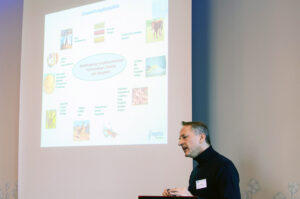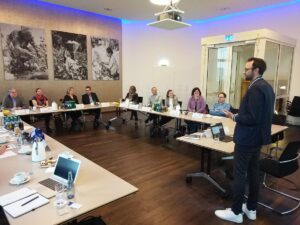Projects for Transparency and Optimization
The Bremen Cotton Exchange is currently involved in two projects in the area of supply chain transparency and optimization. On the one hand, this is a working group on digital supply chain management together with KiK Textilien und Non-Food GmbH, Peek&Cloppenburg KG, ITA Aachen and Chainstep GmbH. The aim of this working group is to create a digital network of textile companies and other relevant stakeholders to enable an efficient exchange of trustworthy quality, sustainability and status information directly between the involved actors. Blockchain technology provides the basis for this.
The second project deals with the availability of data along the supply chain. Global Textile Scheme (GTS) has developed the first standardized industry language and enabling technology to exchange essential data along textile supply chains in an automated way. The goals are lower personnel and interface costs, better data quality and a circular economy – for greater efficiency and sustainability.
Project: Blockchain for GVO Arbitration for Organic Cotton
 From 2018 to 2020, the Bremen Cotton Exchange collaborated with the Bremerhaven-based biotechnology company Impetus Bioscience on a project to explore blockchain technology for the documentation and transfer of data in the cotton trade. Specifically, the project involved product information collected as part of a DNA analysis of traded organic cotton. Cotton samples from deliveries are tested for authenticity based on scientific testing methods. The topic gains relevance especially when it comes to arbitration proceedings in which a contracting party raises doubts about a delivery.
From 2018 to 2020, the Bremen Cotton Exchange collaborated with the Bremerhaven-based biotechnology company Impetus Bioscience on a project to explore blockchain technology for the documentation and transfer of data in the cotton trade. Specifically, the project involved product information collected as part of a DNA analysis of traded organic cotton. Cotton samples from deliveries are tested for authenticity based on scientific testing methods. The topic gains relevance especially when it comes to arbitration proceedings in which a contracting party raises doubts about a delivery.
As is well known, organically certified cotton excludes the use of genetically modified seeds or plants. However, in the production process, for various reasons, there is a high risk of contamination with genetically modified organisms or GMO cotton, which inevitably leads to a dispute. Since the DNA of GMO cotton is known, it can be detected during testing.
The project ran under the working title ‘Blockchain for GMO arbitration in organic cotton’. It was funded by the European Regional Development Fund (ERDF). The aim was, on the one hand, to develop a blockchain concept tailored to the purpose. On the other hand, analytical DNA testing methods for the raw material cotton were to be expanded. These could then be used to define a private sector arbitration standard. As an internationally recognized arbitration court, the Bremen Cotton Exchange could thus take action in the event of a conflict in arbitration proceedings, even for organic cotton traded worldwide or processed in products, and decide on the basis of factual information.
 Against this background, the Bremen Cotton Exchange and the company Impetus Bioscience need to implement reliable control mechanisms with the definition of resilient tolerances. This involves the practicability of checking samples within the entire supply chain. At the same time, data security should be provided.
Against this background, the Bremen Cotton Exchange and the company Impetus Bioscience need to implement reliable control mechanisms with the definition of resilient tolerances. This involves the practicability of checking samples within the entire supply chain. At the same time, data security should be provided.
As part of the project, the Bremen Cotton Exchange and its partners offered various events:
- „Blockchain – Why? Why? Why?”: Introduction to blockchain technology and its use within supply and procurement chains
- „orGENic – challenge organic cotton without genetic engineering” – Current market of organic cotton, DNA anlayse methods, certification systems.
Further information in the interview with the project managers: Higher security for organic cotton: Better testing methods and blockchain project offer solutions
